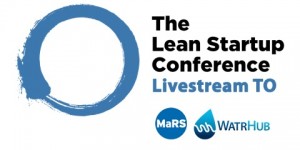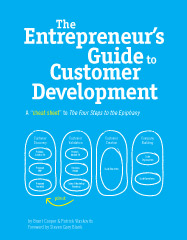


 Some rights reserved by splorp
Some rights reserved by splorp
Back in May, Nat Friedman wrote about the tools used in setting up Xamarin. They include a great set of basic tools for getting a startup off the ground with very little investment. We have seen a lot of startups using a similar set of tools and I thought that we’d compile a list of the tools that we’re actively using (and some of the others we evaluated). There are the tools and blogs listed by Steve Blank that include many
Landing Pages
We’re big fans of WordPress at StartupNorth. We’ve powered StartupNorth on WP since the beginning. The combination of WordPress, Premise, and the WordPress MU Domain Mapping plugin is a pretty powerful combination for creating mutliple sites and landing pages to test your landing pages. But we’ve also developed a sweet spot for Vancouver’s Unbounce, it took us less than 5 minutes to have 2 landing pages and a domain set up. We’re big believers that you can use Adwords and Facebook Ads to quickly create a landing page to test ideas before writing a single line of code.
Analytics
We primarily use Google Analytics and WordPress Stats for StartupNorth. We’ve been working with startups and using a KISSmetrics and Mixpanel to measure activity on their web properties and applications. Make sure you read Ash Maurya’s 3 Rules to Actionable Metrics to understand how the analytics can be used in combination with split testing and/or cohort analysis to better track your optimization before product/market fit (What do you measure before product/market fit? – check out Ash’s conversion funnel and metrics).
Mailing Lists
We haven’t been as proactive in building a mailing list for the StartupNorth community as we probably should have been. I’ve used have started using MailChimp because of the quick integration to GravityForms and WooFoo, but have had very positive experiences using both Campaign Monitor and Constant Contact.
Billing and Accounting
What is amazing is that both of these companies are local to Toronto. We use WaveAccounting integrated with our bank account and PayPal for tracking expenses, billing, and financial operations. And we use Freshbooks to bill for sponsorships. They are a must have in our back office. What we’re missing is a really easy to use and integrated payroll system (I hear that it might be coming).
Human Resources
For full disclosure, I’m an advisor to TribeHR. It doesn’t change the fact that they rock. It is the easiest way to get an HR system in place. And there is no better way to get feedback and help employees improve than Rypple.
Surveys and Feedback
We are actively using Survey.IO to gather feedback from users about the state of StartupNorth. It helps us figure out the state of our product market-fit, if there is such a thing for a blog about Canadian startups, fill it out and help us be better.
Project Tracking
We use Pivotal Tracker. We like them so much, we actively recruited them as a sponsor for StartupNorth. There are lots of other tools from project tools to issue tracking. Curious at what others are using.
Source Control
We use Github Bronze for our project hosting. Most of the code we work on is PHP against MySQL (see WordPress), though we have additional apps in development like the StartupNorth Index (which will be moving to startupnorth.ca/index shortly) but all are LAMP.
Hosting
Full disclosure: VMFarms is a sponsor of StartupNorth. However, their hosted VMs that are backed up and hot mirrored coupled with the outrageous “white glove” makes them a dead simple choice. We also use Rackspace Startups and EC2 for access to easy Linux and Windows VMs for development and testing environments.
Customer Relationship Management
We don’t have any strong recommendations. There are platforms like Salesforce that are fantastic and sales teams are used to. There is Highrise which is broadly supported with a lot of 3rd party tools. But so far, neither of these has been the clear winner for us. There is a great Quora question about “What is the best CRM for startups” that lists SFDC, SugarCRM and Highrise. There are a lot of choices for CRM including Nimble, Insightly, Woosabi, Capsule, Solve360,AppPlane, Batchbook, PipelineDeals, TactileCRM, ZohoCRM and many others.
Conferencing, Screen Sharing & Telecommunications
I’ve been using Calliflower for conference calling. It’s $5/call for up-to 5 callers, or for $30/month unlimited minutes and >70 participants, it’s a great solution. It is not a replacement for a office phone system.
Google Voice and Skype have been the least expensive way as a Canadian startup to get a US phone number. This is great for me as an individual. However, this does not scale to an enterprise or an organization. I’ve been looking at Grasshopper, RingCentral and Toktumi, but I have yet to settle on a solution.
SEO & SEM Tools
This part of the list is pretty much cribbed from Steve Blank’s list of tools for entrepreneurs. Go read it for a more comprehensive list of tools beyond the SEO/SEM listing included below.
What are we missing?
I’m going to cover in the next post: discounted travel, conferences, business cards, design services, and other tricks for being relentless resourceful as a founder.
There are a lot of online tools that startups are using to make or break their business. And there is a lot missing, monitoring like NewRelic, PagerDuty, Pingdom and Blame Stella for example. But I’m curious what are the indispensable tools being used at iStopOver.com, HighScoreHouse, CommunityLend, Idee/Tineye, Massive Damage, Empire Avenue, Indochino, Lymbix, Hootsuite, AdParlor, Locationary, Chango and others. What are you using? What gives you the edge in quickly and effectively gathering feedback to test your hypotheses?



 The ancient Greek aphorism “Know thyself” is very relevant to entrepreneurs. Most founders don’t give much thought to how their own personality type influences how well they run their startup. Remember, your reality distortion field distorts yourself too.
The ancient Greek aphorism “Know thyself” is very relevant to entrepreneurs. Most founders don’t give much thought to how their own personality type influences how well they run their startup. Remember, your reality distortion field distorts yourself too.


